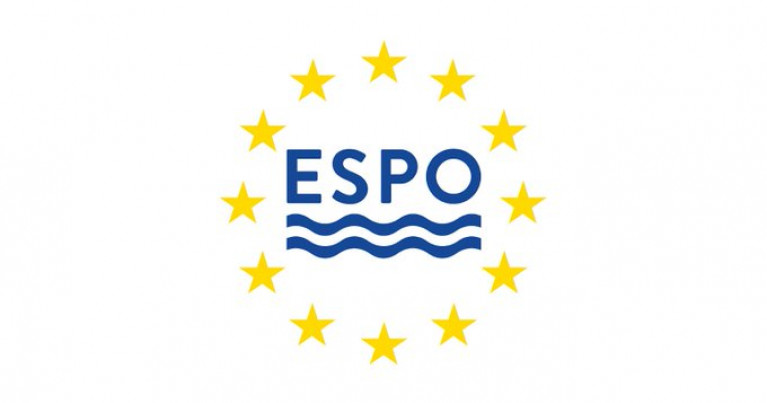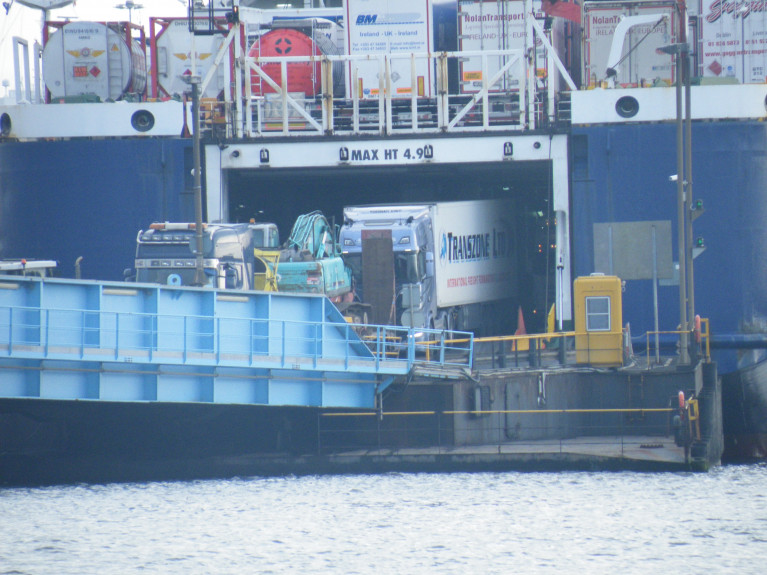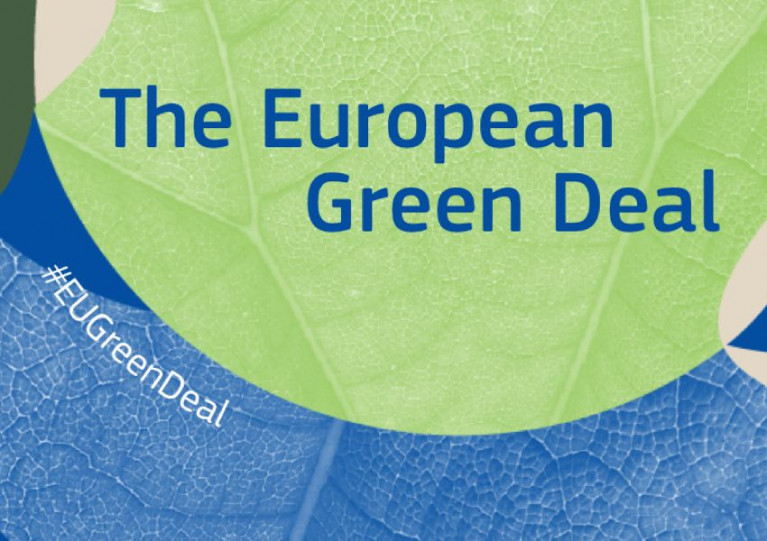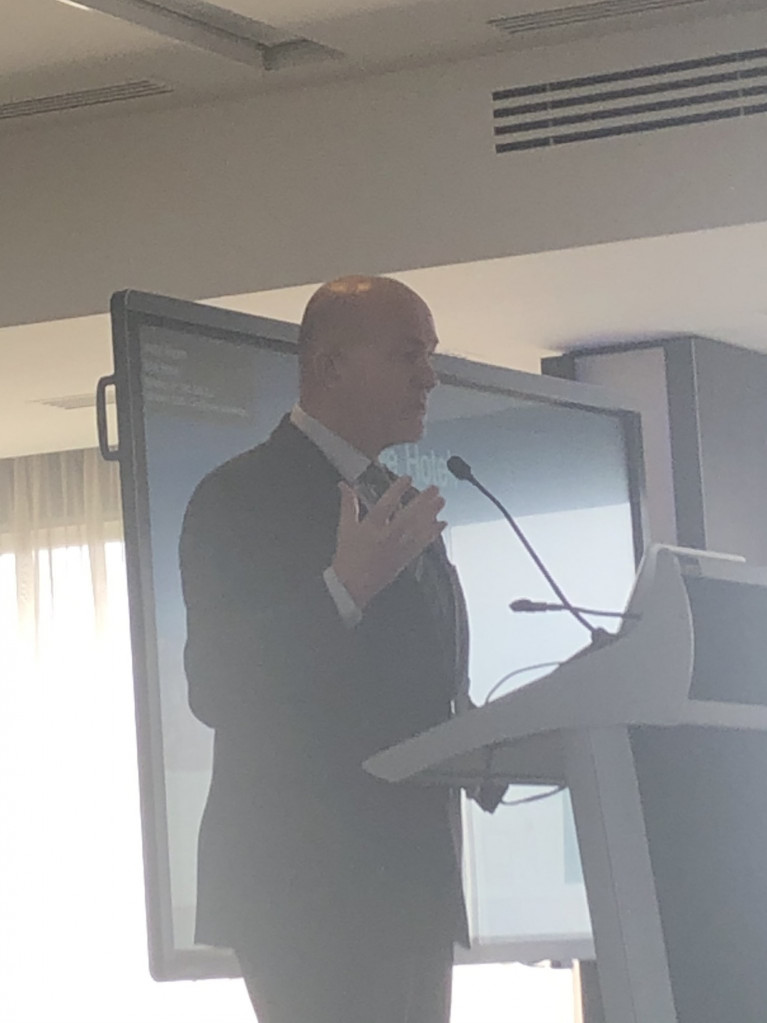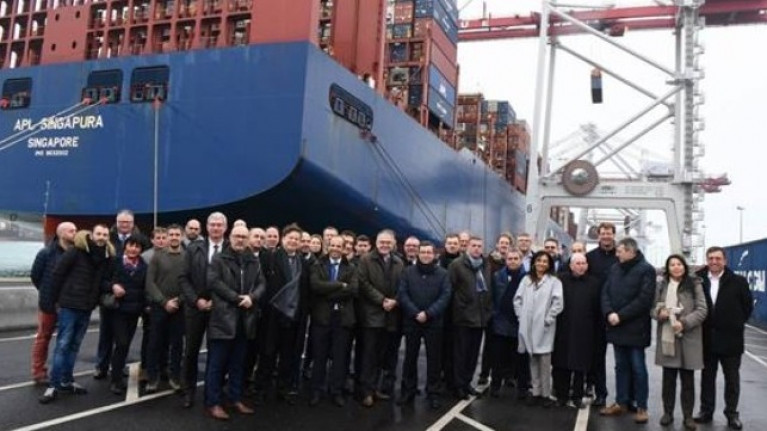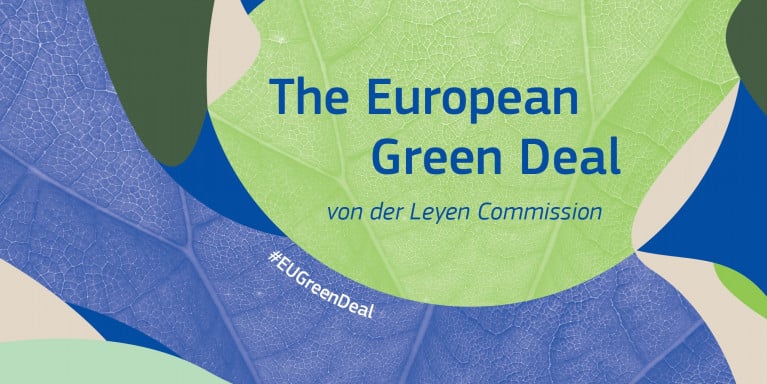Displaying items by tag: European Green Deal
European Green Deal: ESPO Welcomes 'Fit for 55' Package but More Work Required to Make It fit for Purpose
The European Commission yesterday published its so-called “Fit for 55”-package, a package of proposals which should help deliver on the European Climate Law target to reduce greenhouse gas emissions in the EU by at least 55% by 2030, and enable climate neutrality by 2050.
Today the European Sea Ports Organisation (ESPO) welcomed the new “Fit for 55”-proposals as an important first step towards reaching the European Green Deal (see related story) ambition and the 2030 and 2050 goals enshrined in the EU Climate Law.
The package (available here) includes different proposals of relevance to ports: a proposal for a Alternative Fuels Infrastructure Regulation (AFIR), a new proposal to increase the use of alternative fuels by shipping (FuelEU Maritime), the extension of the Emissions Trading System to shipping (EU ETS), amendments to the Renewable Energy Directive (REDIII), and an update of the Energy Taxation Directive.
“The fit for 55-proposals are an important first step: all ingredients are there to deliver the green deal and climate goals. We will now examine the proposals in depth and identify where the port pillar of this green deal architecture should be optimised. For Europe’s ports it is essential to ultimately achieve a policy that is effective in reducing emissions, is coherent, keeps an eye on the competitiveness of Europe’s port sector, is future-proof and does not create stranded assets or additional administrative burden for ports. It should take the diversity of the European port and maritime sector into due consideration,” says ESPO’s Secretary General Isabelle Ryckbost.
To make the proposed package fit for purpose, the following key aspects have to be considered:
Coherence of the package. Full alignment between FuelEU Maritime and the proposal for an Alternative Fuels Infrastructure Regulation will be key. The two different proposals must mirror each other and be considered together throughout the whole legislative process. The same goes for the other interrelated Fit for 55-proposals, which must be fully aligned.
Efficiency in terms of emissions reductions. ESPO calls for an efficient policy that truly delivers in terms of reducing emissions, avoids stranded assets and is future-proof. A goal-based and technology-neutral approach that avoids one-size-fits-all solutions seems the best fit for this purpose. There is no time and no money to waste. ESPO supports a framework that boosts innovation and progress, and enables bottom-up initiatives and coalitions of the willing. Cooperation between all relevant stakeholders will be crucial since unilateral moves will not deliver.
Onshore power supply (OPS) where it makes sense. OPS is an important tool and part of the solution for lowering the shipping emissions at berth, but should not be seen as an end in itself. To ensure a rapid deployment of OPS and avoid a waste of public funds, Europe’s ports must be able to prioritise and focus on deploying OPS where it makes sense in terms of delivering cost-effective reductions of greenhouse gas emissions and air pollution at berth. It remains to see if the approach outlined in Article 5 of FuelEU Maritime and Article 9 in AFIR will lead to the right prioritisation as part of an intelligent approach to OPS.
Safeguarding the competitiveness of the European port and maritime sector. Appropriate solutions will have to be found to the risks of deviation of certain EU port calls to ports outside Europe, linked to certain proposals in the package, certainly if these happen without any gains in terms of emissions (carbon leakage).
Avoiding administrative burden for the port. To remain competitive and efficient, the Fit for 55-package should not lead to unduly complicated calculations, compliance procedures and administrative burden connected to port calls in Europe. Ports in Europe should not become green accountants for the shipping sector.
Providing the funding for 55% emission reductions. Overall, the Fit for 55-package can only deliver if it is accompanied by sufficient support in terms of EU funding for investments in alternative fuels infrastructure, bunkering and production capacity, and retrofitting of existing ships. An ambitious OPS deployment plan in ports requires adequate funding, since every OPS facility installed so far has been supported by 50% or more public financing.
“If Europe is to become fit for 55, it needs to fund for 55. The needed investments in ports to facilitate the greening of shipping are huge. Since there is no silver bullet to green the shipping sector, these are high risk investments with hardly any return on investment for the investing port authority,” comments Isabelle Ryckbost.
ESPO looks forward to discussing the Fit for 55-proposals with the Commission, European Parliament and Council, and to working together with the relevant EU policy makers to deliver an ambitious Fit for 55-package that is fit for purpose.
Following the cabinet’s approval of the Climate Action & Low Carbon Development (Amendment) Bill 2021, the Irish Exporters Association has welcomed the bill.
The bill enshrines carbon neutrality by 2050 into Irish law through the national climate objective - a key aim that underpins the European Green Deal.
Chief Executive of the IEA Simon McKeever commented: “We welcome the approval of the Climate Action and Low Carbon Development (Amendment) Bill 2021. The IEA will work to prepare members for the inevitable policy changes driven by the Bill and indeed the EU Green Deal.
For too long Ireland has lagged in the area of climate action.
The publication of this Bill shows to all parts of society, including the Irish business community, that Ireland will live up to commitments set out in the Paris Agreement which are already written into EU law and the steps must be taken now to achieve the ambitions laid out in the Bill.
It is our place to communicate the aims of the Bill to our members and to support exporters, importers and supply chain actors by informing them of practices they will have to integrate into their operations in order to reach the 2050 target of climate neutrality and indeed the target of reducing emissions by 51% by 2030. Achieving this aim requires buy-in from all sections of society, and the IEA is committed to supporting our members reach this target and play their part.
Sustainable trade and investment are key policy priorities for the IEA. Efforts to tackle climate change and support the transition to more environmentally sustainable practices, that many businesses have already committed to, need to be brought back to the fore and considered as part of Ireland’s overall economic recovery strategy.
We look forward to working with our members by supporting movements towards more sustainable business practices in line with Irish and EU legislation.”
The Enterprise Europe Network is hosting a virtual brokerage event next month on the call for proposals under the European Green Deal.
The free one-day virtual event on Tuesday 13 October — in partnership with Enterprise Ireland, Invest NI and National Contact Points (NCPs) in Northern Ireland — will present insights and expectations from the European Commission and NCPs in all areas of the European Green Deal.
It will also provide a unique opportunity to pitch ideas and expertise in front of leading research organisations and cutting-edge innovators from across industry.
Networking is a feature, with one-to-one meetings to build Horizon 2020 Green Deal consortia in the afternoon and evening, and continuing on Wednesday 14 October.
Participants will also have the opportunity to meet with NCP experts and the Enterprise Europe Network.
The event is open to SMEs, larger companies and research organisations based on the Island of Ireland and across Europe.
For more information or to register for the event, click HERE.
Ports Organisation's Position Paper on European Green Deal Objectives in Ports Revealed At ESW2020
The European Sea Ports Organisation (ESPO) has published its Position Paper on the European Green Deal objectives in ports.
The publication yesterday of EPSO's position paper fits into the European Shipping Week (ESW), currently taking place in Brussels.
In the framework of the ESW, ESPO and ECSA have organised today a workshop on “Decarbonising the shipping industry: What’s already happening and how can we help accelerate it?”.
The Executive Summary of the ESPO Position Paper reads as follows:
1. European ports welcome Europe’s ambition to be the world’s first net zero emission area by 2050. This ambition must be delivered in the most effective way. The competitiveness of Europe’s economy must be safeguarded. Achieving this objective will require an unprecedented level of cooperation across all policy departments and stakeholders.
2. European ports are at the crossroads of supply chains, are clusters of energy, industry and blue economy. They can be a key strategic partner in making the European Green Deal happen.
3. The greening of the shipping sector is a priority for European ports and Europe’s ports are committed to playing their part in helping the shipping sector to make this transition. Close cooperation between ports and shipping lines is required. This cooperation is also largely dependent on decisions of energy producers, energy providers and cargo owners.
4.European ports are diverse and there is no one approach which can be mandated for all ports. Instead, each port should develop a roadmap appropriate to its particular circumstances to prepare for the energy transition of shipping.
5. A goal-based and technology neutral approach is needed to ensure the uptake of clean fuels for shipping, support innovation and avoid stranded assets.
6.A gradual approach should be developed to reduce emissions at berths with an initial focus on berths close to urban areas and a focus on particular segments such as cruise ships and ferries. But such an emission reduction standard at berth is in itself not sufficient to achieve the decarbonisation of shipping. Over time, the objective of zero emissions at berths is achievable. By 2030, CO2 emissions from ships at berth and in ports should be reduced by 50% on average and across all segments of shipping.
7. Onshore Power Supply (OPS) should be encouraged as an important part of the solution. However, alternative solutions which achieve the same objectives should be encourages and allowed.
8. LNG’s role as a transition fuel should be recognised and certainty is needed about the support for investments made from 2021 to at least 2027.
9. Given the international nature of the shipping sector, a global approach is essential if market-based measures are to succeed. The EU should increase the pressure on the IMO to roll out meaningful measures by 2023. ESPO believes that any European proposals such as an Emission Trading Scheme (ETS), a levy or an innovation fund must be thoroughly examined in view of safeguarding the competitiveness of the EU port sector.
10. The review of the Energy Taxation Directive should support the uptake of all sustainable clean fuels, including OPS, by introducing a permanent tax exemption for all of them.
11.ESPO fully recognises and supports the role of rail and inland waterway transport as sustainable hinterland modes for freight. Motorways of the Sea and Short Sea Shipping can however be just as effective as rail and inland waterways in providing an alternative to road transport. In addition, pipelines can play a crucial role in the transport of certain modalities and the implementation of certain decarbonisation technologies.
12. Many European ports are important clusters of energy and industry. These ports are players and partners in achieving the energy transition. Greening “the port” means much more than greening the transport side. All industry players in the port should have their agendas, goals and plans and the port managing body must support the industries in the port in their pathways to a more sustainable future.
13. Seaports and waterborne transport should be seen as a priority in ensuring resilience to climate change. In that respect, European ports welcome the European Green Deal’s commitment to adopt a new and more ambitious strategy on adaptation to climate change.
14. Digitalisation will increase the transparency in the supply chain and can help create awareness of the carbon and environmental footprint of the whole supply chain. By improving the communication, gathering and exchanging real-time information among different parties, logistics processes can be optimised and transport infrastructure and means (avoiding empty trucks, trains and ships) can be used in a better way. Digitalisation must be seen as an additional instrument to meet the Green Deal objectives.
15. A strong MFF is essential for Europe to invest in a sustainable future. Getting an agreement on a strong MFF must show that both European and national policy makers walk the talk. Extensive support from the Connecting Europe Facility (CEF) is an absolute prerequisite for port investments, especially if there are mandatory provisions on the installation of certain technologies. Both core and comprehensive TEN-T ports should be eligible. Support will also important for turning port areas into clean energy hubs and for ensuring connectivity to clean energy grids.
The full ESPO Position Paper can be read here.
Container Ship at French Port Inaugurates Shoreside Power
Container ship APL Singapura operated by CMA CGM became the first ship to use the Port of Dunkirk's shoreside power (cold ironing) facilities last week.
The cold ironing system reports The Maritime Executive, was installed at the Terminal des Flandres in France will become fully operational during the first half of 2020.
Actemium, a consortium of two companies (Brest and Boulogne) was selected to carry out the works including the design and supply of the system which fits into six 40-foot containers. With a capacity of 8MW – enough to power nearly 1,000 homes – this system is one of the most powerful ever to be installed in Europe.
The operation was co-financed by the Urban Community of Dunkirk, the Hauts-de-France region (via the European Regional Development Fund), and the Port of Dunkirk. The CMA CGM Group covered the cost of the equipment needed to connect the vessel.
In December last year, the European Sea Ports Organisation (ESPO) welcomed Europe’s ambition to become the world’s first climate neutral continent by 2050, as proposed in the European Green Deal published on December 11. The Green Deal states that transport should become drastically less polluting, especially in cities. The Commission says it will take action in relation to maritime transport, including to regulate access of the most polluting ships to E.U. ports and to oblige docked ships to use shoreside power.
Europe’s Green Deal Ambition Welcomed by ESPO
Europe’s ambition as enshrined in The European Green Deal published on 11 December, to become the world’s first climate neutral continent by 2050 has been welcomed by European Sea Ports Organisation.
According to ESPO, European ports are at the crossroads of supply chains. As clusters of transport, energy, industry and blue economy, they add great value and are at the service of the European economy and society. They are a strategic partner in making this ambitious European project happen.
In the coming weeks, ESPO and its members will put forward concrete proposals on how to contribute in the best and most effective way to implement the objectives of the Green Deal.
“We share the European Green Deal ambition, which is in line with ESPO’s priorities for the period 2019-2024. The publication of the European Green Deal is an important milestone. Together with our members, we are now developing a concrete plan on how to go forward, how ports can contribute, what policy and financial instruments are needed to support European ports in this huge project. We are looking forward to working with the Commission, Parliament and Council in shaping the policy”, says ESPO’s Secretary General Isabelle Ryckbost



























